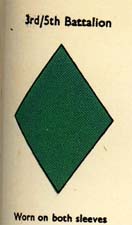
|
3/5th Bn
The XX The Lancashire Fusiliers WW1 |
 |
|
'Preserved' WWI
British officer found 90 YEARS ON
30th May 2005 The remarkably well preserved remains of a British officer, killed in one of the bloodiest battles of the First World War, have been discovered in the mud of Flanders. The man, still wearing his gas cape, boots and helmet, was killed during the battle of Passchendaele almost 90 years ago. A Commonwealth War Graves Commission team is due to arrive in Belgium today to help identify the Lancashire Fusiliers' officer, whose remains were found by archaeologists. The officer, who was found on Friday, is one of more than 58,000 men who fought in the notorious Ypres Salient in Belgium during the Great War with no known grave. Some half-a-million allied soldiers died in the mud and blood of this sector of the western front before the assault intended to smash the German line was called off after four months. The officer was apparently buried hastily, according to the man leading the archaeological team searching a railway embankment that cut through the British and German lines during the battle. Among items found on his body were a wallet containing a stamp and a silver case of cigarettes. Franky Bostyn, curator of the Passchendaele Museum, said the man also had a wristwatch. "He was in a shell hole wrapped in his gas cape and when we carefully removed that, we saw the whole body was completely preserved," he said. "He was not buried, just thrown in, but he had his full equipment on him." The dense blue clay of Flanders is credited with preserving the soldier's equipment and personal belongings. Juergen Debeleye, the museum's deputy head of research, said: "The clay is a marvellous preservative. The buttons on his tunic shone like new and we could tell instantly what regiment he was with. "This was a wonderful find. He even had his wallet with him, and a Bible was found near the body. He would have been buried very quickly. We hope to have an identity for the man soon. "It will be wonderful to give a name to an unknown soldier,
for his family to know he can at last be buried with full military
honours."
|

|
Died on 20/05/1918 Private James Mackin. 3rd Lancashire Fusiliers, transferred to the Labour Corps Private James Mackin, age 21, of the Lancashire Fusiliers,
son of Mr and Mrs J. W Mackin, Factory Street , Middleton, was killed
on May 20th, 1918. Mrs Mackin received a letter from her son's captain
in which he said. "Your son was killed instantaneously by shellfire.
I personally was present at the burial, which took place in a pretty
cemetery in the country surrounding the village where he was billeted. Private Mackin is laid to rest at Daours Communal Cemetery Extension, France. The 3rd Battalion didn't leave England, he was previously with the 1st Lancashire Fusiliers. |